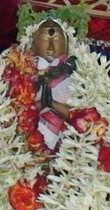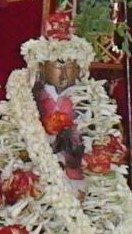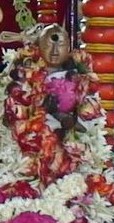
Kotpuli, also known as Kotpuliyar and Kotpuli Nayanar, was a Nayanar saint, venerated in the Hindu sect of Shaivism. He is generally counted as the fifty-seventh in the list of 63 Nayanars.

Apputhi Adigal, also spelt as Apputhi Adikal, Atputhi Adigal, Apputi Adigal, Appoodi Adikal, Appoothi Adikal and Appudhi Adigal and known as Appuddi Nayanar, was a Nayanar saint, venerated in the Hindu sect of Shaivism. He is generally counted as the twenty-fifth in the list of 63 Nayanars. He is described as a contemporary of Appar or Thirunavukkarasar, one of the most prominent Nayanars.
Yenathinathar, also known as Yenatinata, Yenathi Nayanar, Yenadhinatha, Yenadinath, Yenadinatha Nayanar and Yenadhinatha Nayanar, was a Nayanar saint hailing from Channar clan, venerated in the Hindu sect of Shaivism. He is generally counted as the ninth in the list of 63 Nayanars. In 1901, P.Sv. Perumal Nadar formed Srimath Yenathinadha Nayanar Thirumadalayam at Aruppukottai

Sakkiya Nayanar was a Nayanar saint, venerated in the Shaiva sect of Hinduism. He is generally counted as the thirty-fourth in the list of 63 Nayanars. He was a crypto-Hindu posing as a Buddhist, practicing Shaivam in secrecy. He was reported to have worshipped Lord Shiva, his patron god, by hurling stones at his iconography.
Idangazhi (Idangali), also known as Idangazhi Nayanar, Idangaliyar (Idankaliyar) was a Nayanar saint, venerated in the Hindu sect of Shaivism. He is generally counted as the fifty-fourth in the list of 63 Nayanars. He was an Irukku Velir chieftain, who is described to not only have pardoned a devotee of the god Shiva, who stole from the royal granaries, but also distributed rice to devotees of Shiva.
Kalikamba Nayanar, known as Kalikkamba, Kalikamba, Kalikambar, Kaliyamba, Kalikkambar, Kalikkampa(r), Kali Kambanar, Kalikkampa Nayanar and Kaliyamba Nayanar(u), is a Nayanar saint, venerated in the Hindu sect of Shaivism. He is generally counted as the forty-third in the list of 63 Nayanars. His hagiography speaks about how he cut the hand of his wife, who did not help in serving a Shaiva, devotee of the god Shiva.
Satti Nayanar, also known as Satti (Sathi), Sathiyar, Shakti Nayanar, Shakti, Shaktiyar (Saktiyar), Sattiyandar and Thiru-Saththi Nayanar, is a Nayanar saint, venerated in the Hindu sect of Shaivism. He is generally counted as the 45th in the list of 63 Nayanars. Satti Nayanar is described to cut off the tongue of whoever talked ill of his patron god Shiva or Shiva's devotees.

Murkha Nayanar, also known as Moorka Nayanar, Murka Nayanar, Moorkha Nayanar, Murgga Nayanar, Moorkka Nayanar and Murkhar, is a Nayanar saint, venerated in the Hindu sect of Shaivism. He is generally counted as the thirty-second in the list of 63 Nayanars.

Somasi Mara Nayanar, also known as Somasi Maranar, Somasi Marar, Somasimarar and Somasira Nayanar, is a Nayanar saint, venerated in the Hindu sect of Shaivism. He is generally counted as the thirty-third in the list of 63 Nayanars. He is also called Marar, Maran and Mara Nayanar, names he shares with Ilayankudi Mara Nayanar. The two Nayanars are generally differentiated by the prefixes "Somasi" and "Ilayankudi". He was a contemporary and devotee of Sundarar.

Isaignaniyar, also spelt as Isainaniyar, Isaignaniyaar, Isaignaniar and Isaijnaniyar and also known as Isai-jnani Ammaiyar, is the mother of Sundarar, one of the most prominent Nayanar saints. She is herself regarded as a Nayanar saint, venerated in the Hindu sect of Shaivism, along with her husband Sadaiya Nayanar. She is generally counted as the last in the list of 63 Nayanars.

Sadaiya Nayanar or Sadaiyar is a 7th century Nayanar saint in the Hindu sect of Shaivism, venerated for being father of the prominent saint Sundarar rather than for individual merit. He and his wife Isaignaniyar are generally counted as sixty-second and sixty-third on the list of the sixty-three Nayanar saints. Sundarar is the only Nayanar with both parents venerated.
Viralminda Nayanar, also known as Viranmindar (Viranmintar), Viranmintan and Viranminda Nayanar, is a Nayanar saint, venerated in the Hindu sect of Shaivism. He is generally counted as the sixth in the list of 63 Nayanars. He was a contemporary of Sundarar. He along with Cheraman Perumal Nayanar are the two Nayanars from Kerala. Viralminda Nayanar is described in legends as the reason Sundarar composed a hymn to the Nayanar saints, which became the first compilation of the list.
Eyarkon Kalikkama Nayanar, also known as Kalikkamanar, Kalikamba Nayanar, was a King of Haihaya (Eyar), Commander-in-chief of the Chola army, a Nayanar saint, venerated in the Hindu sect of Shaivism. He is generally counted as the 29th in the list of 63 Nayanars.

Sirappuli Nayanar, also known as Sirappuli, Sirapuli Nayanar, Sirappuliyar (Chirappuliyar), was a Nayanar saint, venerated in the Hindu sect of Shaivism. He is generally counted as the thirty-fifth in the list of 63 Nayanars. Sirappuli Nayanar is described to have served the devotees of the god Shiva and worshipped the god with various ritual practices.

Seruthunai Nayanar, also known as Seruthunai, Seruthunaiyar and Seruttunai Nayanar, was a Nayanar saint, venerated in the Hindu sect of Shaivism. He is generally counted as the 55th in the list of 63 Nayanars.
Amaraneedi Nayanar, also known as Amarneethi (Nayanar), Amarneeti (Nayanar), Amarniti (Nayanar), Amar-Nidhi (Nayanar) and Amarneethiyar, was a Nayanar saint, venerated in the Hindu sect of Shaivism. He is generally counted as the seventh in the list of 63 Nayanars.

Pugazh Thunai Nayanar, also known as Pugazhthunai Nayanar, Pugalthunai Nayanar, Pukazhtthunai Nayanar, Pukazhtthunaiyar and Pukalttunai, was a Nayanar saint, venerated in the Hindu sect of Shaivism. He is generally counted as the fifty-sixth in the list of 63 Nayanars.

Kutruva Nayanar, also known as Kootruva , Kutruva, Kutruvar, Kootruvar, Kurruva Nayanar, Kurruvar, Kurruvan, Kutruvanar, Kurrrruvar, Kalappallan and Kalappalar, was a chieftain of Kalandai and a Nayanar saint, venerated in the Hindu sect of Shaivism. He is generally counted as the 39th in the list of 63 Nayanars. Kutruva is often described as a Jain, who became a devotee of Shiva, the patron god of Shaivism.

Munaiyaduvar, also known as Manai Aduvar Nayanar, Munaiyaduvar Nayanar, Munayaduvar, Munayaduvaar, Munaiyaduvaar and Munaiyatuvar, was a Nayanar saint, venerated in the Hindu sect of Shaivism. He is generally counted as the 52nd in the list of 63 Nayanars. Munaiyaduvar is described as a mercenary soldier, who would fight for the weak and vanished and use the fees received in service of his patron deity Shiva and the god's devotees.
Ilayankudi Maranar, also known Ilaiyangudi Nayanar, Ilaiyankuti Nayanar, Ilayangudi Mara Nayanar, is a Nayanar saint, venerated in the Hindu sect of Shaivism. He is generally counted as the fourth in the list of 63 Nayanars. He is also called Marar, Maran and Mara Nayanar, names he shares with Somasi Mara Nayanar. The two Nayanars are generally differentiated by the prefixes "Ilayankudi" and "Somasi".





